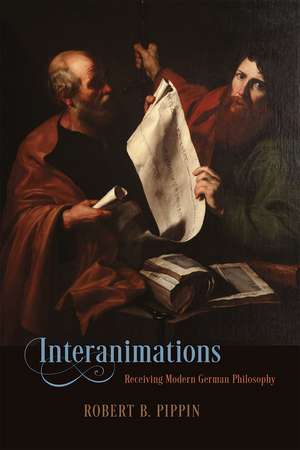Interanimations: Receiving Modern German Philosophy
Autor Robert B. Pippinen Limba Engleză Hardback – 21 iul 2015
In this latest book, renowned philosopher and scholar Robert B. Pippin offers the thought-provoking argument that the study of historical figures is not only an interpretation and explication of their views, but can be understood as a form of philosophy itself. In doing so, he reconceives philosophical scholarship as a kind of network of philosophical interanimations, one in which major positions in the history of philosophy, when they are themselves properly understood within their own historical context, form philosophy’s lingua franca. Examining a number of philosophers to explore the nature of this interanimation, he presents an illuminating assortment of especially thoughtful examples of historical commentary that powerfully enact philosophy.
After opening up his territory with an initial discussion of contemporary revisionist readings of Kant’s moral theory, Pippin sets his sights on his main objects of interest: Hegel and Nietzsche. Through them, however, he offers what few others could: an astonishing synthesis of an immense and diverse set of thinkers and traditions. Deploying an almost dialogical, conversational approach, he pursues patterns of thought that both shape and, importantly, connect the major traditions: neo-Aristotelian, analytic, continental, and postmodern, bringing the likes of Heidegger, Honneth, MacIntyre, McDowell, Brandom, Strauss, Williams, and Žižek—not to mention Hegel and Nietzsche— into the same philosophical conversation.
By means of these case studies, Pippin mounts an impressive argument about a relatively under discussed issue in professional philosophy—the bearing of work in the history of philosophy on philosophy itself—and thereby he argues for the controversial thesis that no strict separation between the domains is defensible.
After opening up his territory with an initial discussion of contemporary revisionist readings of Kant’s moral theory, Pippin sets his sights on his main objects of interest: Hegel and Nietzsche. Through them, however, he offers what few others could: an astonishing synthesis of an immense and diverse set of thinkers and traditions. Deploying an almost dialogical, conversational approach, he pursues patterns of thought that both shape and, importantly, connect the major traditions: neo-Aristotelian, analytic, continental, and postmodern, bringing the likes of Heidegger, Honneth, MacIntyre, McDowell, Brandom, Strauss, Williams, and Žižek—not to mention Hegel and Nietzsche— into the same philosophical conversation.
By means of these case studies, Pippin mounts an impressive argument about a relatively under discussed issue in professional philosophy—the bearing of work in the history of philosophy on philosophy itself—and thereby he argues for the controversial thesis that no strict separation between the domains is defensible.
Preț: 211.73 lei
Preț vechi: 239.61 lei
-12% Nou
Puncte Express: 318
Preț estimativ în valută:
40.53€ • 44.04$ • 34.06£
40.53€ • 44.04$ • 34.06£
Carte indisponibilă temporar
Doresc să fiu notificat când acest titlu va fi disponibil:
Se trimite...
Preluare comenzi: 021 569.72.76
Specificații
ISBN-13: 9780226259659
ISBN-10: 022625965X
Pagini: 272
Dimensiuni: 152 x 229 x 30 mm
Greutate: 0.57 kg
Ediția:1
Editura: University of Chicago Press
Colecția University of Chicago Press
ISBN-10: 022625965X
Pagini: 272
Dimensiuni: 152 x 229 x 30 mm
Greutate: 0.57 kg
Ediția:1
Editura: University of Chicago Press
Colecția University of Chicago Press
Notă biografică
Robert B. Pippin is the Evelyn Stefansson Nef Distinguished Service Professor in the John U. Nef Committee on Social Thought, the Department of Philosophy, and the College at the University of Chicago. He is the author of several books, including After the Beautiful and Nietzsche, Psychology, and First Philosophy, both also published by the University of Chicago Press.
Cuprins
Introduction
1 Rigorism and the New Kant
2 Robert Brandom’s Hegel
3 John McDowell’s Germans
4 Slavoj Žižek’s Hegel
5 Axel Honneth’s Hegelianism
6 Alexander Nehamas’s Nietzsche
7 Bernard Williams on Nietzsche on the Greeks
8 Heidegger on Nietzsche on Nihilism
9 Leo Strauss’s Nietzsche
10 The Expressivist Nietzsche
11 Alasdair MacIntyre’s Modernity
Acknowledgments
Bibliography
Index
1 Rigorism and the New Kant
2 Robert Brandom’s Hegel
3 John McDowell’s Germans
4 Slavoj Žižek’s Hegel
5 Axel Honneth’s Hegelianism
6 Alexander Nehamas’s Nietzsche
7 Bernard Williams on Nietzsche on the Greeks
8 Heidegger on Nietzsche on Nihilism
9 Leo Strauss’s Nietzsche
10 The Expressivist Nietzsche
11 Alasdair MacIntyre’s Modernity
Acknowledgments
Bibliography
Index
Recenzii
“In Interanimations, Pippin brings his interpretations of German philosophers into conversation with others' interpretations. . . . This book is highly recommended.”
